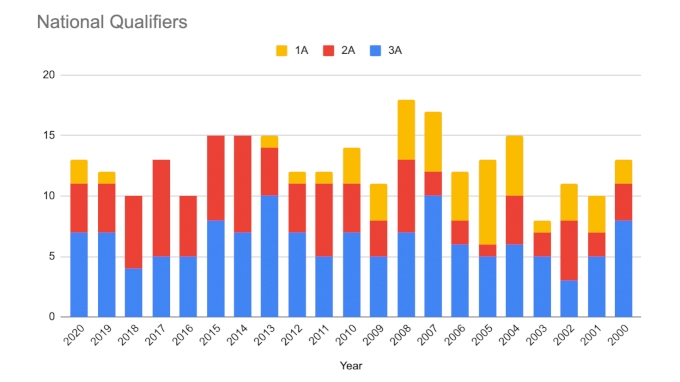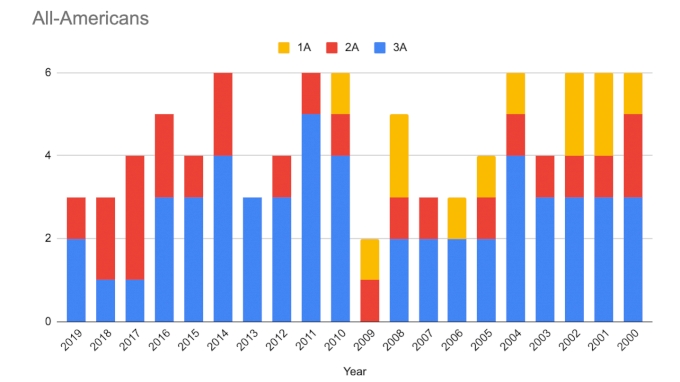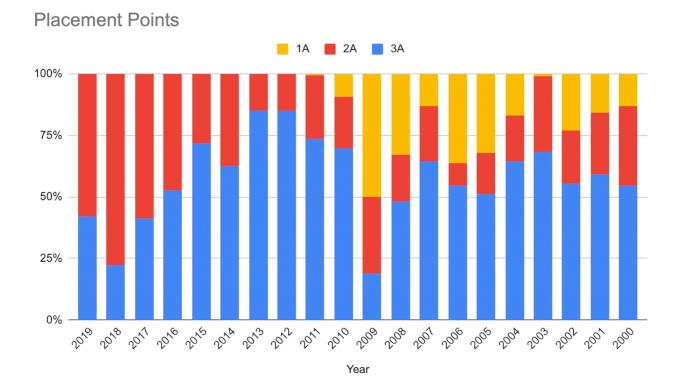Iowa Class War: Which Is The Best At Producing NCAA Talent?
Iowa Class War: Which Is The Best At Producing NCAA Talent?
Comparing how well Iowa produces NCAA results across the three classes.

Unlock this article, live events, and more with a subscription!
Already a subscriber? Log In
Last week, my friend and colleague Brock Hite wrote a very nicely done article on which class in Pennsylvania, AA or AAA, is better at producing NCAA talent. Naturally, it got me thinking about my home state of Iowa.
Iowa uses three classes — 1A, 2A, 3A — with 1A being the smallest and 3A being the largest. Similar to PA, which classes’ state champions are the best can be debated from year to year, but the classes start to separate themselves as you get further from the top. This is largely a result of having a larger drawing pool of athletes.
Here are the numbers from the 2019-2020 season:
1A - 119 schools, total enrollment 9-11 of 16,955
2A - 96 schools, total enrollment 9-11 of 28,282 (low cutoff of 206)
3A - 64 schools, total enrollment 9-11 of 62,948 (low cutoff of 400)
These numbers work out to approximately the following ratios: 1A:2A = 1:1.6, 2A:3A = 1:2.2, 1A:3A = 1:3.7. Or, rather, 1A makes up about 16%, 2A 26%, and 3A 58% of the total enrollment. Keep these numbers in mind when dissecting and judging the following NCAA numbers.
One last housekeeping item before getting into the data — when considering transfers I used the school an athlete competed at the most years (ex: Ross Larson considered Ballard and 2A). The only case I found of a future NCAA NQ wrestling two years in one class and two years in the other was Willie Miklus. For the purpose of this article, Miklus is attributed to Southeast Polk and 3A. When considering schools that jump between classes, whichever class the athlete competed more years in got the nod (ex: Eric Juergens, Maquoketa, considered as 3A). A select few competed 2 years in 2 different classes, in these cases I went with whichever class the school has competed more years in (ex: Chad Beatty, Wilton, considered 1A). If you have any questions, comments, or concerns about this or the data feel free to DM me on Twitter, @rader_jd, or email: jd.rader@flosports.tv.
National Qualifiers
Let’s start with qualifiers. Iowa high school wrestlers, so not Thomas Gilman, earned 269 bids to the National Championships over the past two decades with a high of 18 in 2008 and low of eight in 2003. About half of those came from 3A, 30% from 2A, and 20% from 1A. These numbers bode slightly well for 1A and 2A when considering the ratios and percentages of athletes - 1A 16%, 2A 26%, 3A 58%.
| Year | 3A | 2A | 1A | Total |
| 2020 | 7 | 4 | 2 | 13 |
| 2019 | 7 | 4 | 1 | 12 |
| 2018 | 4 | 6 | 10 | |
| 2017 | 5 | 8 | 13 | |
| 2016 | 5 | 5 | 10 | |
| 2015 | 8 | 7 | 15 | |
| 2014 | 7 | 8 | 15 | |
| 2013 | 10 | 4 | 1 | 15 |
| 2012 | 7 | 4 | 1 | 12 |
| 2011 | 5 | 6 | 1 | 12 |
| 2010 | 7 | 4 | 3 | 14 |
| 2009 | 5 | 3 | 3 | 11 |
| 2008 | 7 | 6 | 5 | 18 |
| 2007 | 10 | 2 | 5 | 17 |
| 2006 | 6 | 2 | 4 | 12 |
| 2005 | 5 | 1 | 7 | 13 |
| 2004 | 6 | 4 | 5 | 15 |
| 2003 | 5 | 2 | 1 | 8 |
| 2002 | 3 | 5 | 3 | 11 |
| 2001 | 5 | 2 | 3 | 10 |
| 2000 | 8 | 3 | 2 | 13 |
| Total | 132 | 90 | 47 | 269 |
While 1A had a hard drought from 2014-2018, their 2004-2010 gave them quite a boost. In fact, they even lead in number of qualifiers in 2005 with 7. 2A had a really strong showing the same period 1A went through their drought.

All-Americans
Clearly not every NQ is equal, so let's move on to All-Americans. This is where 3A turns the tables a bit. Iowa has produced a total of 89 All-American finishes the past 20 years with 53 coming from 3A, 24 from 2A, and 12 from 1A. When it comes to All-Americans 3A surpasses their ratio a bit, 2A is almost exact, and 1A underperforms.
| Year | 3A | 2A | 1A | Total |
| 2020 | ||||
| 2019 | 2 | 1 | 3 | |
| 2018 | 1 | 2 | 3 | |
| 2017 | 1 | 3 | 4 | |
| 2016 | 3 | 2 | 5 | |
| 2015 | 3 | 1 | 4 | |
| 2014 | 4 | 2 | 6 | |
| 2013 | 3 | 3 | ||
| 2012 | 3 | 1 | 4 | |
| 2011 | 5 | 1 | 6 | |
| 2010 | 4 | 1 | 1 | 6 |
| 2009 | 1 | 1 | 2 | |
| 2008 | 2 | 1 | 2 | 5 |
| 2007 | 2 | 1 | 3 | |
| 2006 | 2 | 1 | 3 | |
| 2005 | 2 | 1 | 1 | 4 |
| 2004 | 4 | 1 | 1 | 6 |
| 2003 | 3 | 1 | 4 | |
| 2002 | 3 | 1 | 2 | 6 |
| 2001 | 3 | 1 | 2 | 6 |
| 2000 | 3 | 2 | 1 | 6 |
| Total | 53 | 24 | 12 | 89 |
The 2010s were not nice to you if you were a 1A fan. You have to go all the way back to 2010 and Ryan Morningstar to find the last D1 All-American. 3A lead each year excluding 2018 and 2017, thanks to 2A Denver-Tripoli and Union alums, and in 2009 when they had 0 AAs.

NCAA Placement Points
Now, not every All-American is equal either, so let's go one step further: NCAA placement points. These are the amount of points each national qualifier earned minus bonus points. For example, a national champion brings in 20 points while a wrestler who won 1 match on the backside brings in 0.5 points. This time it's 2A bringing home the best score in relation to athlete ratio and percentage with 3A about right at their 58% and 1A below their 16%.
| Year | 3A | 2A | 1A | Total |
| 2019 | 17.5 | 24 | 41.5 | |
| 2018 | 7.5 | 26 | 33.5 | |
| 2017 | 25.5 | 36 | 61.5 | |
| 2016 | 32 | 28.5 | 60.5 | |
| 2015 | 44.5 | 17.5 | 62 | |
| 2014 | 45 | 27 | 72 | |
| 2013 | 45.5 | 8 | 53.5 | |
| 2012 | 54 | 9.5 | 63.5 | |
| 2011 | 60 | 21 | 0.5 | 81.5 |
| 2010 | 66.5 | 20 | 9 | 95.5 |
| 2009 | 5.5 | 9 | 14.5 | 29 |
| 2008 | 31.5 | 12.5 | 21.5 | 65.5 |
| 2007 | 34.5 | 12 | 7 | 53.5 |
| 2006 | 24 | 4 | 16 | 44 |
| 2005 | 31 | 10 | 19.5 | 60.5 |
| 2004 | 55.5 | 16 | 14.5 | 86 |
| 2003 | 36.5 | 16.5 | 0.5 | 53.5 |
| 2002 | 31.5 | 12.5 | 13 | 57 |
| 2001 | 43 | 18 | 11.5 | 72.5 |
| 2000 | 52.5 | 31 | 12.5 | 96 |
| Total | 743.5 | 359 | 140 | 1242.5 |
Both 3A and Iowa as a whole's best year came in 2010 with 3A champions as well as high school and college teammates Matt McDonough and Jay Borschel, 3A runner-up Montell Marion, 2A runner-up Andrew Long, 1A AA Ryan Morningstar, and 3A AA Jarion Beets.

This graph and data emphasizes it more so than any other - it's been a tale of two decades when it comes to NCAA output for 1A while 2A and 3A have remained mostly consistent.
Conclusion
There are three takeaways from this article.
1. Over the past 20 years, 3A has dominated the NCAA output that has come out of the state of Iowa. There's no denying it. However, if you apply the "per capita/enrollment/athlete" argument to the data, the numbers are fairly even across the board.
2. I'm not sure why, but 1A excelled from 2000-2010 and then severely struggled from 2010-2019.
3. The best of the best come from 3A. Take a look at this absurd stat: Iowa has had nine national champions since 2000 with Eric Juergens and Matt McDonough both winning twice. Counting Juergens as 3A, he wrestled 2A for one year, he wrestled 3A for 3 years, eight of those nine champions have come from 3A. Drew Foster, 2A Mediapolis, is the only non 3A D1 national champion of the past 20 years.
| Year Of Title | Name | High School | Class |
| 2019 | Drew Foster | Mediapolis | 2A |
| 2017 | Cory Clark | Southeast Polk | 3A |
| 2015 | Kyven Gadson | Waterloo East | 3A |
| 2013 | Derek St. John | Iowa City West | 3A |
| 2012 | Matt McDonough | Marion | 3A |
| 2010 | Matt McDonough | Marion | 3A |
| 2010 | Jay Borschel | Marion | 3A |
| 2007 | Trent Paulson | Lewis Central | 3A |
| 2004 | Cliff Moore | Dubuque Hempstead | 3A |
| 2001 | Eric Juergens | Maquoketa | 3A |
| 2000 | Eric Juergens | Maquoketa | 3A |